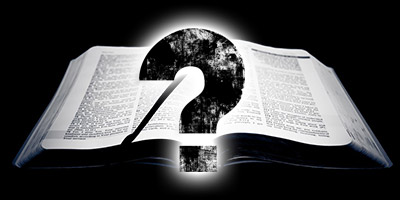The Plague of Biblical Illiteracy
Is your Bible knowledge up to date?

At Lamb & Lion we begin each day with a devotional. One staff member reads from the Bible, another reads from a devotional book, and then all the staff members join together in prayer, praying for each other and for the prayer requests we have received by mail, telephone and email. The devotional book we use is Our Daily Bread, which is published by RBC Ministries in Grand Rapids, Michigan. The devotional for October 18, 1991 began with this story:
A pastor asked a class of Sunday School children, “Who broke down the wall of Jericho?” A boy answered, “Not me, sir!” Upset, the pastor asked the teacher, “Is this typical?” She replied, “I believe this boy is honest, and I really don’t think he did it.” The pastor went to the head deacon. “I’ve known the boy and the teacher for years,” said the deacon, “and neither of them would do such a thing.” Aghast, the pastor went to the Christian Education Board. “Pastor,” said the chairman, “let’s not make an issue of this. Let’s just pay for the damage and charge it to the upkeep.”
This humorous story, which 20 years ago would have been considered ludicrous, has become a reality in the modern day church. Biblical knowledge among professing Christians has become abysmal.
The Extent of the Problem
A person who has spent much time studying this serious problem is Gary M. Burge who serves as a professor of New Testament at Wheaton College in Wheaton, Illinois. Wheaton is one of Christendom’s premier Evangelical colleges.
For the past four years Burge has been testing incoming freshmen on their knowledge of the Bible. What he has found is alarming. Keep in mind that most of the students entering Wheaton come from strong Evangelical churches and have a long history of Christian involvement in youth groups, camps and missions. They use the Bible regularly, but few seem to have any in-depth knowledge of what it says.
Burge has concluded that we in America definitely live in a postbiblical era, and he points to the results of his tests to prove his point. One-third of the freshmen could not put the following in chronological order: Christ, Abraham, Pentecost, and the Old Testament prophets. Half could not sequence these events: Isaac’s birth, Judah’s exile, Moses in Egypt, and Saul’s death. Incredibly, one-third could not identify Matthew as an apostle from a list of New Testament names. When asked to locate the biblical book supplying a given story, one-third could not find Paul’s travels in Acts, half did not know that the Christmas story was in Matthew or that the Passover story was in Exodus.
When Burge began to survey high school students at strong Evangelical churches, he discovered that they could average only 50 to 55 percent correct on his simple 25 question exam. Fully 80 percent could not place Moses, Adam, David, Solomon, and Abraham in chronological order. Only 15 percent could place in order the major events of Jesus’ and Paul’s lives; and only 33 percent could find the Sermon on the Mount in the New Testament. A whopping 80 percent did not know where to find the Lord’s Prayer.
It leads you to wonder what is being taught and preached at Evangelical churches today. Are preachers delivering warmed over inspirational talks from the Reader’s Digest? Are Sunday School teachers using the Bible at all? Is the Bible the least read best seller of all times?
How is your knowledge of the Bible? Try testing it with the following test composed by Mr. Burge.
1. Which one of these books is not in the Bible?a. Isaiah2. Who was Israel’s first king?
b. Jude
c. Hezekiah
d. Amos
e. Song of Solomon
a. Saul3. Sarah and Abraham had a son in their old age and named him “laughter.” What was his real name?
b. Solomon
c. David
d. Samuel
e. Moses
a. Samuel4. Which of the following is not an Old Testament prophet?
b. Moses
c. Isaac
d. Jacob
e. Ishmael
a. Elisha5. Place these events in their biblical order: a. the giving of the law at Mount Sinai; b. Creation; c. the Fall; d. the Exodus led by Moses; e. the flood of Noah
b. Elijah
c. Aaron
d. Isaiah
e. Joel
a. c, b, a, d, e;6. Place the following characters in their biblical order: a. Moses; b. Adam; c. David; d. Solomon; e. Abraham
b. b, c, e, d, a;
c. b, e, c, a, d;
d. d, a, e, b, c;
a. b, e, a, c, d;7. Which of the following books is from the New Testament?
b. d, e, a, c, b;
c. b, e, a, d, c;
d. b, c, e, a, d;
a. Judges8. Who wrote Philemon?
b. Malachi
c. Deuteronomy
d. Hebrews
e. Isaiah
a. Philemon9. Which one of the following was among Jesus’ 12 apostles?
b. Paul
c. Peter
d. Onesimus
e. John
a. Paul10. Whom did Pontius Pilate release during Jesus’ trial?
b. Matthew
c. Luke
d. Timothy
e. Silas
a. Barnabas11. How many temptations did Jesus face in the wilderness?
b. Peter
c. Silas
d. Barabbas
e. Paul
a. one12. Place the following events in their biblical order: a. The Holy Spirit descends on Pentecost; b. John has a vision on Patmos; c. Jesus is baptized in the Jordan River; d. Paul, Barnabas and Mark are sent out on a mission by the church; e. Peter denies that he knows Jesus
b. two
c. three
d. four
e. five
a. c, e, a, d, b;13. Place the following events in their biblical order: a. Paul’s arrest in Jerusalem; b. Mary’s song; c. Nicodemus’ conversation about rebirth; d. Peter’s denial of Jesus
b. b, a, e, d, c;
c. c, e, a, b, d;
d. d, e, a, c, b;
a. d, a, c, b;14. Where would you find the Ten Commandments?
b. c, a, b, d;
c. b, c, d, a;
d. a, c, d, b;
a. Isaiah15. Where would you find the first Passover?
b. Exodus
c. Genesis
d. Numbers
e. Matthew
a. Genesis16. Where would you find “Create in me a clean heart, O God”?
b. Numbers
c. 1 Samuel
d. Exodus
e. 2 Kings
a. Proverbs17. Where would you find the Lord’s Prayer?
b. Ezekiel
c. Psalms
d. Deuteronomy
e. Luke
a. Matthew18. Where would you find “in the beginning was the Word”?
b. Acts
c. Ephesians
d. Malachi
e. Isaiah
a. Acts19. Elizabeth and Zechariah were the parents of:
b. Isaiah
c. John
d. Leviticus
e. Romans
a. Jesus20. Jesus was crucified during:
b. Samuel
c. Paul
d. Timothy
e. John the Baptist
a. Passover
b. Hannukah
c. Tabernacles
d. Sabbath
e. Purim


